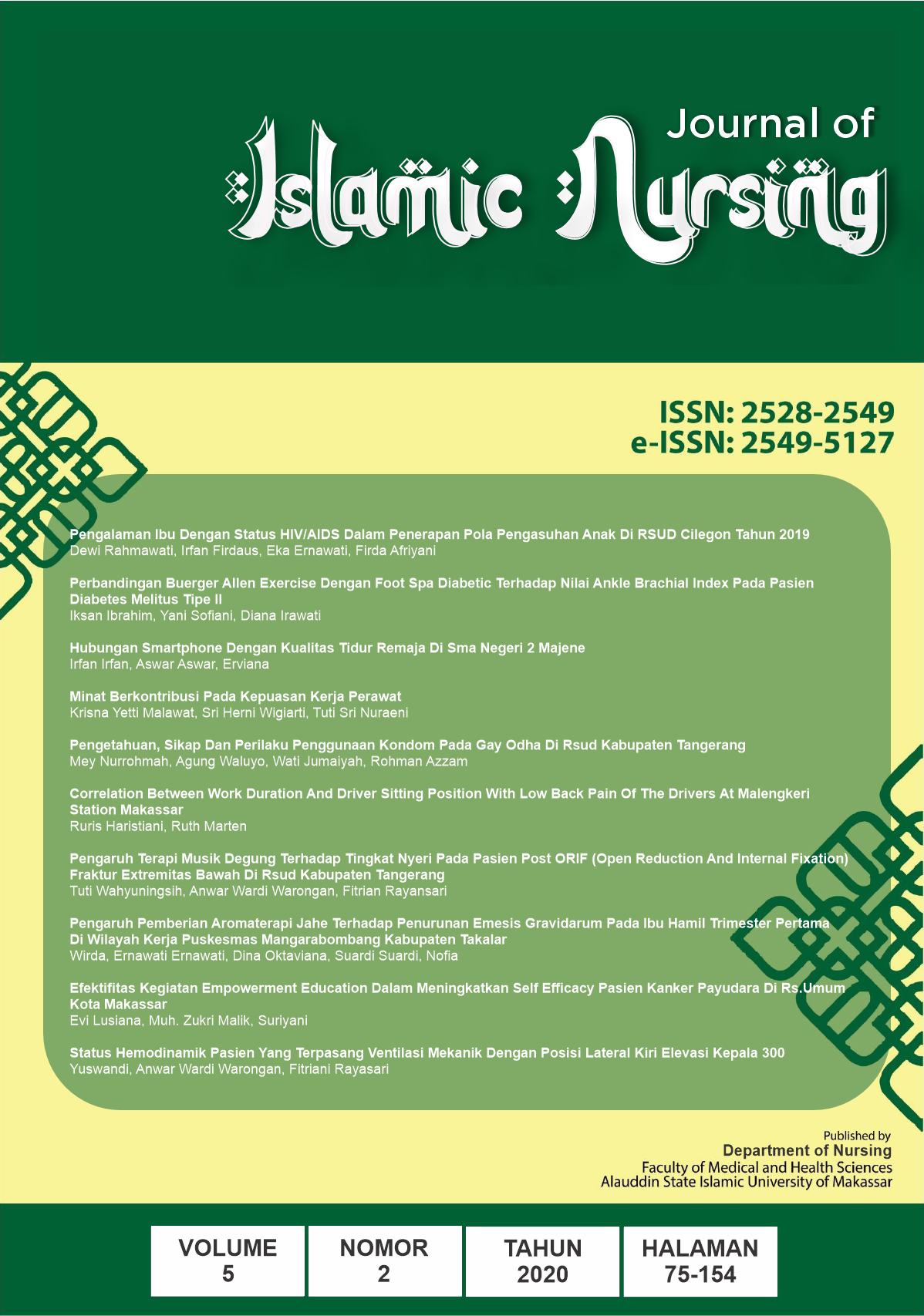PENGALAMAN IBU DENGAN STATUS HIV/AIDS DALAM PENERAPAN POLA PENGASUHAN ANAK DI RSUD CILEGON TAHUN 2019
Abstract
Mothers with positive HIV status risk to failure in role adaptation, which causes confusion in carrying out multiple roles, which results in the inaccuracy of parents in implementing parenting styles for their children. The purpose of this study was to explore in depth the meaning of the experience of mothers with HIV / AIDS as a parent in implementing parenting. The method used in this research is a qualitative method using a descriptive phenomenology approach. While the data collection method used is by using in-depth interviews until 40-60 minutes. The participants were five people who were registered as patients at the Poli Flamboyan RSUD Kota Cilegon. We used phenomenological data analysis with Collaizi’s approach. The researcher applied the ethical principles in the form of Respect for Autonomy and self-determination, Confidentiality and anonymity, and Protection from discomfort and harm. The results obtained five themes which significantly describes wail of the wife with HIV / AIDS status, unbelieve in HIV / AIDS status, fear of being stigmatized, the impact of HIV on the adoption of parenting styles and feelings of failure to become mothers. There needs to be education or counseling for parents with HIV / AIDS regarding choosing the implementation of parenting for children along with the Peer Support Group (KDS) program for people with HIV / AIDS to increase the spirit of ODHA to continue their life.
Keywords: HIV/AIDS, Mother, Parenting
Downloads
References
REFERENSI
Chingono, e. a. (2018). Evaluating the Effectiveness of a Multicomponent Intervention on Early Childhood Development in Paediatric HIV Care and Treatment Programmes : a Randomised Controlled Trial. BMC Pediatric, 1-10.
Dariyo, A. (2011). Psikologi Perkembangan Anak Tiga Tahun Pertama. Bandung: Refika Aditama.
Emawati, E. R. (2019). Life Experiences of Women (Housewives) Diagnosed Hiv - Aids in Serang. Kne Life Sciences, 272-283.
Erna Kusumawati, A. R. (2015). Studi Kualitatif Resiko Penularan HIV/AIDS Melalui Penggunaan Tato Di Kecamatan Semarang Tengah Kota Semarang. The 2nd University Research Coloquium, 507-514.
Fitriyani, L. (2015). Peran Pola Asuh Orang Tua dalam Mengembangkan Kecerdasan Emosi Anak. Lentera, Vol XVII No.1, 93-110.
Handayani, S. (2018). Keberlanjutan Peran Dukungan Sebaya di Dalam Sistem Penanggulangan HIV Di Tingkat Provinsi dan Kota/Kabupaten Indonesia. Perilaku dan Promosi Kesehatan, 44-53.
Hidayanti, E. (2013). Strategi Coping Stress Perempuan dengan HIV/AIDS. SAWWA , Vol.9 No. 1, 89-106.
Hurlock, E. B. (2011). Psikologi Perkembangan: Suatu Pendekatan Sepanjang Rentang Kesehatan. Jakarta: Erlangga.
Irfan Ardani, S. (2017). Stigma terhadap Orang dengan HIV/AIDS (ODHA) sebagai Hambatan Pencarian Pengobatan: Studi Kasus pada Pecandu Narkoba Suntik di Jakarta. Buletin Penelitian Kesehatan, Vol.45, No.2. 81-88.
Karina, S. P. (2009). Memahami Pola Asuh pada Ibu yang Terinfeksi Human Immunodeficiency Virus. Ejournal Undip, 1-20.
Moleong, L. J. (2014). Metodologi Penelitian Kualitatif Edisi Revisi. Bandung: PT. Remaja Rosdakarya.
Nurarif, A. (2015). Aplikasi Asuhan Keperawatan Berdasarkan Diagnosa Medis dan Nanda Nic-Noc. Jogjakarta: Mediaction.
Nurina Dyah Larasati, Z. S. (2015). Bentuk-bentuk Dukungan Keluarga Terhadap Ibu dengan HIV Positif dalam Kepatuhan Terapi ARV di Kota Semarang. Jurnal Promosi Kesehatan Indonesia, Vol.10/N0.2, 116-130.
P2P, D. (2017). Laporan Situasi Perkembangan HIV-AIDS & PIMS di Indonesia. Jakarta: Kementerian Kesehatan RI.
Panji Andika Pratama, R. I. (2012). Dukungan Keluarga dan Depresi pada Penderita HIV/AIDS Di Yogyakarta. Psikologika, 29-37.
Rahakbauw, N. (2016). Dukungan Keluarga Terhadap Kelangsungan Hidup ODHA (Orang Dengan HIV/AIDS). INSANI, 64-82.
RI, K. K. (2018). Pusat Data dan Informasi HIV AIDS. Jakarta: Kementerian Kesehatan.
Rita Susanti, D. H. (2014). Perasaan Terluka Membuat Marah. Jurnal Psikologi, Vol. 10 Nomor 2, 103-109.
Rizka Ristriyani, I. N. (2018). Berduka Pada Perempuan HIV Positif. Jurnal Keperawatan Indonesia, Vol.21, No.1, 1-8.
Rokhmah, D. (2015). Pola Asuh dan Pembentukan Perilaku Seksual Berisiko Terhadap HIV/AIDS pada Waria. Jurnal Kesehatan Masyarakat, 125-134.
Sarafino, E. (2006). Health Psychology: Biopsychology. Fifth Edition. USA: John Wiley & Sons.
Septiana Dewi Indriani, D. (2017). Karena Hidup Harus Terus Berjalan (Sebuah Studi Fenomenologi Kehidupan Orang dengan HIV/AIDS). Jurnal Empati, 385-395.
Setiyorini, E. (2015). 2015. Jurnal Ners dan Kebidanan, 6-14.
Setyoadi. (2013). Pengalaman ODHA Mendapatkan Dukungan Sosial dalam Menjalani Kehidupan Sehari-hari Di Malang Raya. Jurnal Ners, Vol. 8 No. 2, 240-252.
UNAIDS. (2019). UNAIDS Data 2019. UNAIDS: Geneva.
WHO. (2019). WHO HIV Update. Jenewa: WHO.


